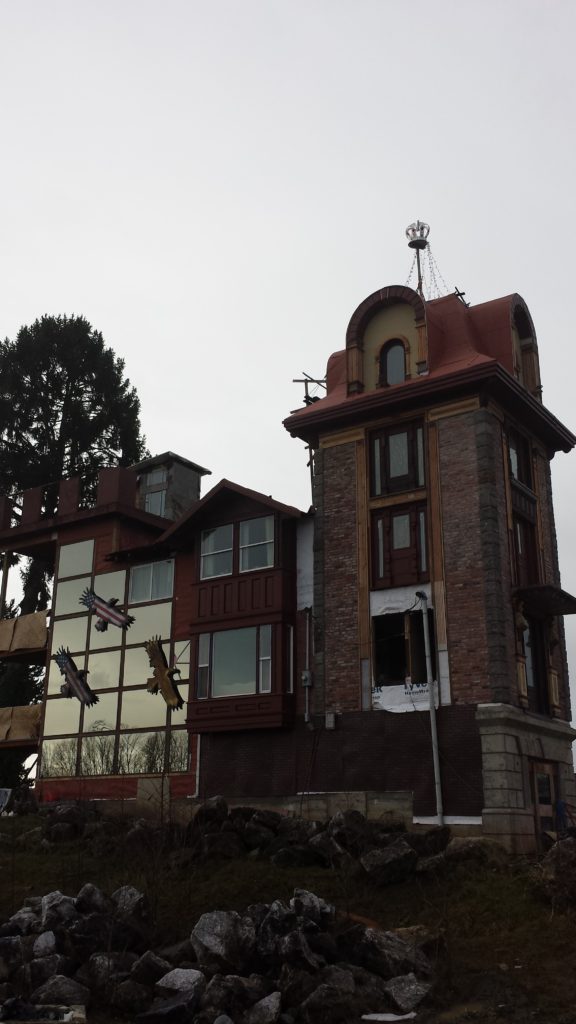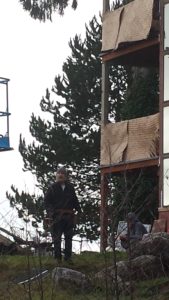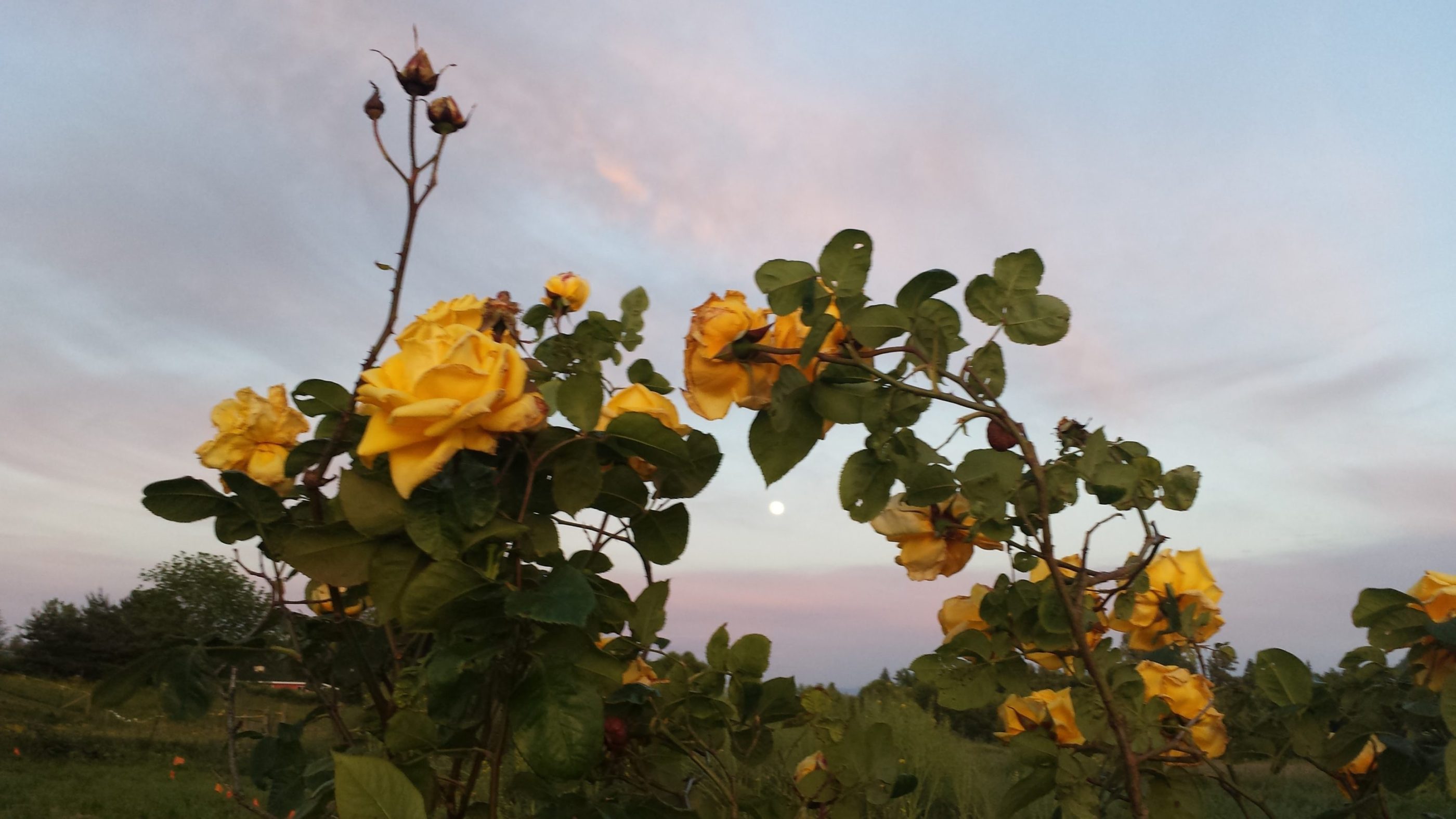Here I am on the outskirts of a small town in the upper northwest corner of the United States, out in what is called “The County”. The friends we’ve made over the last twelve years have also been on the outskirts of the culture of this place in time and space. Our Polish friends, Art and Margaret Roszja are a good example. They come from a very long line of artists and scientists. Margaret’s father, still in Poland, is an astronomer and was a political prisoner in Poland. Last year he received the highest civilian medal for withstanding repression. Her great-great-great paternal uncle was Frederick Chopin and her paternal aunt, Bronislawa Kawalla, is an internationally renowned pianist and judge on the panel of the international Chopin Competition. Art’s cousin was murdered by the Secret Services in Poland. He became a national martyr and hero. His brother is the pre-eminent classical guitarist of Europe. They fled Poland in 1988 with a small child after a series of events that convinced them of the need to escape a repressive regime where freedom of expression was almost non-existent and where one could easily loose one’s life in challenging authority.
After finding refuge in a refugee camp in Norway, Canada eventually opened its door to them when the US would not. They worked hard in Canada, raised children, created a thriving construction business with public sector contracts, renovated their home near Vancouver and finally decided to come to the US, where Art’s father, grandfather and great grandfather were citizens. For him, it was a return to his homeland.
Their imagination, energy and creativity lead them to aspire to do something unique for a community where they hoped to find stimulation and inspiration, something with whimsy, something unusual, something beautiful and in its own way astounding so those passing by and those in the surrounding area would be able to experience something out of the ordinary, something that demonstrated the possibilities of mind, the extravagance of the spirit. They could have renovated the old house as others have done, making it a dull, pleasing Craftsman-style set of boxes, painted in drab colors, but they instead conceived of a multi-story Clock Tower, which would be set off by the stunning view of Mt. Baker as you come from the west on Main Street towards the center of town. They had the energy, money and willingness to do something significant for the town. We all imagined the clocks facing in the four directions, maybe even a chime sounding the hours. Margaret hoped her aunt would come to play piano for the public at the completion.
The judge told them on Friday, among other things, that since they had chosen to do something unusual, creative and unique, causing the city to stretch its thinking about what is permissible, they need to be grownups and take the responsibility for all “the trouble” they’ve caused the City of Ferndale in the past nine years. They have been categorized as “a nuisance” for all these years of struggle to finish their project. Never during the nearly four hours of hearings I’ve attended in 2016 was there any mention of the errors the city has committed. No suggestion the city may have brought the whole weight of years of conflict down upon themselves. The local blogger, driven by an ostensible devotion to journalistic objectivity mentions only the government version of the story presented to the court. He has little effort to dig any deeper. Neither has any other local paper, including “alternative” news.
On Friday, Art and Margaret narrowly escaped the fine of over $100,000 the city sought to impose for failing to comply with the terms of a voluntary agreement issued by the court in February. The city also requested the couple cover all the city’s legal fees (including “staff time” which probably encompasses the hours spent by several city officials who have attended all the hours of court hearings without cause). It is unclear whether the judge will require this. However, it is clear the judge issued an order stating that the Roszjas were in contempt of the court’s order from February, although no mention was made at court or in the resulting order of what elements of construction were not completed. In fact, all the elements agreed to were completed, within specifications and on time. The decision of contempt was based solely on the word of the City’s Planner who came to the site and declared the elements unfinished. No independent inspector was allowed by the city, although requested by the Roszjas. In February, the Roszjas had consented to their attorney’s recommendation and agreed to a faulty order in order to simply move ahead to complete the planned construction, putting the fight behind them and accepting in good faith, as they purported, that the city shared the same goal.
They returned home to do just that, but the city almost immediately had further orders. Each time the Roszjas moved forward to complete elements of the construction they had been permitted to complete, the city sent them repeated correspondence questioning the legality or safety of things they had already permitted. In March, they mandated that the reflective glass the Rojszas had installed on the east side of the building be removed and replaced with siding. The city felt they had the right to approve the type of siding the Roszjas would use to replace the glass, although there is no legal basis for this claim. Any other home owner in the city is free to replace siding or replace a roof without permits. The permit for the siding went back and forth for weeks, as had previous permit requests. After much delay and indecision, they required the Roszjas to purchase a Structural Engineering Analysis of the siding proposal, something also not required in any other circumstance when home owners are renovating a home. The engineer the city specified was unable to take on the job for at least a week, further delaying the project.
At court, the judge gave the appearance of again wanting to reach a just compromise in a difficult situation, citing the old test of a true compromise–“Neither side will be happy with the decision.” However, for a judicially ordered compromise to be just, it must be based on the judiciously weighed facts presented by both sides in a dispute. In this case, the Roszjas have never been allowed to present the evidence of the city’s bad behavior in this conflict. The court appears to believe that if a government claims that something is so, it is so. Those accused of opposition to the rules of the government evidently have no standing to present a case that runs contrary to the government claims. The position of the Superior Court of Whatcom County runs counter to the whole concept of Due Process.
The Roszjas went home again on Friday, changed their clothes and went back to work to complete what they understand the city will allow them to complete. Tomorrow, the judge will review requests from both attorneys and decide whether there will be further threats of fines and/or a requirement for the Roszjas to pay the city’s legal fees and costs. The city has repeatedly denied they are treating the Roszjas any differently from any other residents within the city’s boundaries. They feel there is no evidence of bad behavior on their part, no prejudicial or persecutory acts.
We just wonder what will happen. The people damaged by all of this are the Roszjas. No damage has been done to the good denizens of the city. No one’s safety has been compromised. The supposed insult to the eyes of the community has been caused by the city’s inaction and ineptitude, if not downright deliberate prejudicial treatment. Although it is the Roszjas who are being treated as criminal actors, guilty of opposition and neglect if not malicious mischief, it is actually the city who is behaving in a manner contrary to American Constitutional Law. The people of the City of Ferndale have, in fact, been damaged not by any compromise of their safety or pollution of the environment, but by the loss of an opportunity to experience something, day after day, which provides a window into a realm beyond the drudgery of the daily grind. They have been deprived of the generosity of art.
It is the Roszjas who will pay for daring to contribute something beyond the normal for which they have been willing to expend large amounts of their own energy and financial resource to accomplish. This is just the sort of oppression and repression by bureacracy they sought to flee twenty-eight years ago.




